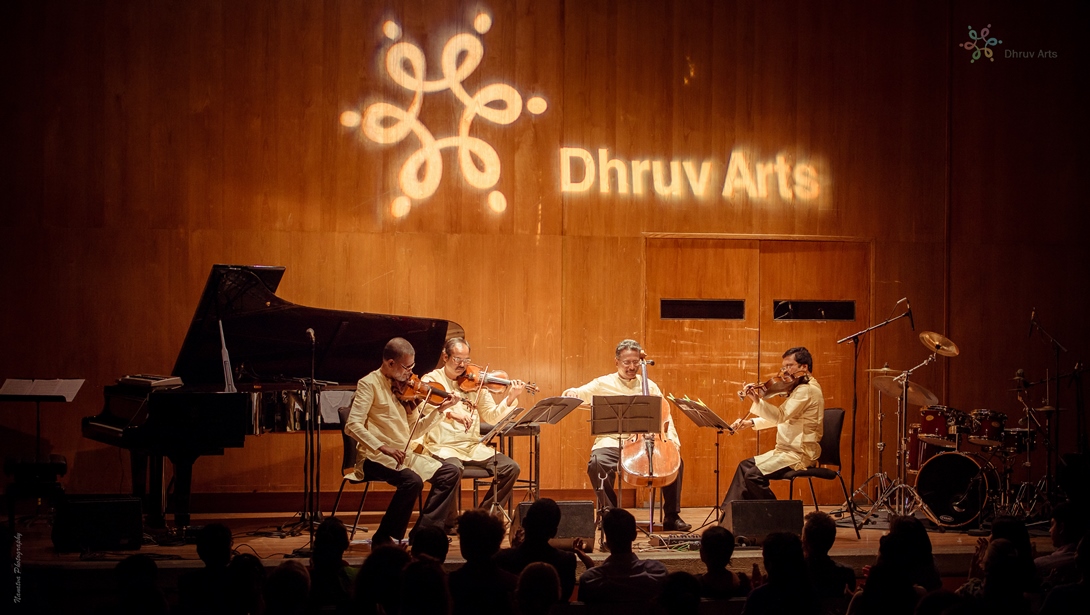A string quartet playing Carnatic music, with Western harmonies. Madras String Quartet’s is a brand of classical fusion that remains fairly unique even in this day and age when fusion bands are in abundance. Despite their uniqueness though, the quartet took quite a while to get noticed. It was not until a series of their performances got uploaded on Youtube in 2007 perhaps that that happened (at least I did not know of the group until I saw one of those videos in 2008, that of Thyagaraja’s Mokshamu, one that still counts among my favourite pieces by them). After seven years of following their music, I finally got to see the quartet live last Friday at London South Bank Centre, at an event conducted by Dhruv Arts. What’s more, I also got to interact with the group members and interview the main man, legendary violinist-composer V S Narasimhan. Key excerpts from the conversation:
Let’s start with an account of your journey so far.
We formed the quartet in 1993. Started off by playing Western classical – Mozart, Haydn etc. We were earlier playing together in Madras Chamber Orchestra which I used to lead at that point so this was just something we formed post the breakup of the orchestra. Subsequently, based on my experience of working with various composers and my own knowledge in Western classical music, I started doing small arrangements for Carnatic music. I started off with this composition Raaravenu, putting harmonies and rhythm around it; it sounded nice and quite unique at that time. I was thrilled, and thought why not continue on this line. I wrote some arrangements for string quartet (at times with help from Finale Software). In 2000 we had the opportunity to record live, and that led to our first album called Resonance. The album received a lot of appreciation from people like Maxim Vengerov, Yo-Yo Ma, Zakir Hussain (VSN laughs while recollecting how Zakir Hussain joked to him, “oh you don’t need percussion at all, what are we going to do now?!”). After that the other musicians of the quartet got busy (V R Sekar, Hemanthraj Muliyil, BJ Chandran are all quite active in movies as well), so for our second album Raga Saga I recorded the first three parts myself – first and second violin, and viola – and Sekar recorded the cello. Our latest album Raga Fantasy was aimed at bringing out the importance of lyrics in Carnatic music, and therefore had three voice tracks featuring Bombay Jayasree and Sriram Parthasarathy.
You were majorly involved in Ilayaraja’s 1986 fusion album How to Name It. How much did your work there influence the formation of Madras String Quartet?
Raja’s idea was different. He wanted to write a counterpoint to Western pieces like Bach Sonata with Indian classical elements. He was essentially looking to Indianise the Western compositions. I approached it from the other end, picking up Carnatic pieces and adding harmonies to them, even playing them like percussion. When you use an actual percussion instrument, the syncopations are all tuned to one pitch. But when we approach it this way, the harmony elements afford more flexibility in the pitch aspect of the rhythmic elements.
Does any of your music come out of jamming, or is it always prepared beforehand, given the format?
Among the musicians in the group, Sekar is fairly familiar with Carnatic music given his background (Sekar is the son of Carnatic violin maestro Kunnakudi Vaidyanathan), but the others are predominantly Western musicians and not much jamming happens between us. I basically conceive the idea in my head and write down the parts with the help of a keyboard. After writing the complete score I take it to the other musicians and make changes if required.
So there is not much improvisation that happens, outside of what is written?
Talking of improvisations, I have written additional swara kalpana portions for some of my recent compositions. Now I am looking to have more live improvisations, where each of us gets a solo part like in Carnatic music. I believe we are the only quartet in existence that plays Carnatic – Sekar plays occasional alaaps on stage, and I am looking to extend that to the others. I don’t consider myself a big Carnatic musician, but whatever I have learnt from my father keeps me going. And I want to encourage my partners too; in their regular line of work in movies, they just play what they are given by the composers and don’t get to explore on their own. I want to give them the opportunity to do that while performing in the quartet.
Are you working on any album right now?
Nothing at the moment. The last one was Raga Fantasy in 2013, and then two members dropped out, and in their place we now have Mohan Rao (second violin) and Sasikumar (viola).
How do you think the whole scene has changed from the time you started off, in terms of how people perceive your music? There would have been purists criticising your style at least in the beginning?
We have never really received that kind of criticism, most of our experiences have been of people telling us that they never realised Carnatic compositions could be interpreted this way too. There was one critic I remember though, who said that we should not be picking up keerthanas like this, we should just be creating our own stuff. I just ignored that. What I play, if you take out the harmonic elements, is true to the original Carnatic style. The other elements just enhance it.
How much do you work on your interactions with the general public, outside of your concerts? You obviously are not very active on digital media.
We have done workshops with youngsters, explaining what we do, how to produce harmonies and so on. They mostly happen in Chennai, but we also made two visits to Bangalore, at Azim Premji University. We wish and hope to do more of those in future.
You played on Music Mojo on Kappa TV last year. How was the experience? What do you think of such shows?
It was a really good experience working with Sumesh Lal. I have been following other bands on the show too, they have been doing some really good work.
You used to compose in movies until a while back. Any plans to return?
In the last 10 years or so I have not done anything in films, I have been purely focused in this. No plans to go back to movies either.
You have toured the UK once before. How has the experience of performing here been?
Yes, last time we did a three city tour – Bristol, Leeds and London. At Bristol we had a fantastic experience – 90% of the audience were whites, and we probably have never received an appreciation like we did at that venue. They weren’t in a mood to let us go at all!
Are you covering any other places in this trip?
After this gig we travel to Brussels, followed by Italy. Then we return to UK for a gig in Liverpool (Milapfest’s Indika, on 31st of July) – all organised by the ICCR.




